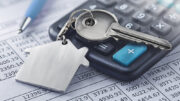Tax is a complex subject and many landlords do not fully understand their tax liabilities, deductions or have a strategy in place to ensure they do not unnecessarily pay more tax than they could be.
Many landlords are sole traders and for tax purposes classes as being “self – employed” for taxing purposes. Some landlords may also have an “employed” job, but that does not mean they are not also self-employed and will be required to completed a tax self-assessment to calculate how much tax is due from your rental property.
Tax, accounting and record keeping – Keep it simple!
Ideally the landlord should have a separate bank account for the rental business, even if this is just one property. This enables all the property income and expenditure to be kept separate which makes record keeping much easier – and should a tax inspector want to verify figures in your accounting, it will be much more straight forward to do so. There are many basic internet-only” type bank accounts, which are free to transfer electronically in and out of, which assuming your tenant(s) pay by bank transfer will meet your needs perfectly well.
Rough guide to calculating tax liabilities
A general rule of thumb for tax liabilities for rental income, is roughly the rental amount, minus the interest element of the mortgage, divided by 4. This is the amount you should save each month towards your tax bill. The final amount will be less than this once you have deducted the expenses. If you are a higher rate tax payer then instead of dividing the profit by 4, you will need to divide it by 2.
Transferring property to the lowest rate tax payer within a marriage
If you are a married couple and you pay a higher rate of tax (but your spouse does not) you can transfer a property from the sole ownership of the higher earner to the sole ownership of the lower earner, so the property income is taxed at a lower rate. There is no capital gains tax to pay on such a transfer, but some Stamp Duty Land Tax may be due if the property is mortgaged.
What can be deducted as business expenses
Expenses include the costs of repairing the property and keeping it maintained. It also includes fees you have to pay to letting agents, solicitors and any other services which are required in order for you to rent the property (eg, the cost of a gas safety certificate). The largest expense in most cases is the interest element of the buy to let mortgage.
• Interest on buy-to-let mortgage payments.
Remember that it is only the interest, not any capital you repay, that is tax deductable. For this reason it is worth bearing in mind that the higher the interest element of the buy to let mortgage you are paying, the lower your tax bill should be (if all other things are equal!).
• Upkeep and maintenance costs.
Structural repairs to a rental property, such as repainting or repairing a broken window, are allowable tax expenses. It is important to remember that any actual improvements to a property, such as building a conservatory, will not be seen as tax deductible, however if there was a conservatory and it required a new roof, then this would be classed as an expense, because it is maintaining a part of the property.
• Letting agency fees.
If you let your property via a letting agent, up to 15% of the monthly rental income will be charged as a fee to the agent. Letting agent’s costs on your tax return are an allowable tax expense.
• Property insurance premiums.
Any insurance premiums on the rental property can be claimed back, including buildings and contents insurance and landlord rent guarantee insurance.
• Council tax and utilities bills.
If the landlord pays the council tax and other bill (and not the tenant) then you can claim these as an allowable tax expenses.
• Legal services
If you hire legal services in relation to the tenancy, whether this is help with the initial contracts, or the legal process of evicting a tenant, then these fees are also classes as expenses because they were essential to facilitate the rental.
HINT: When calculating rental income, do not count the tenants deposit! This is not income and should not be counted as such.
Maximising profit from your rental property, will inevitably have an impact on the tax which is due, but that it not to say you could not benefit more by increasing profit! One of the quickest way of doing this is by checking your buy to let mortgage is the most suitable for you – buy to let mortgage rates vary enormously, so if you haven’t had a mortgage check up recently, speak to Ascot Mortgages, the UK specialist buy to let and commercial mortgage brokers.
You can check the latest Government advice for Landlords here.







Be the first to comment on "Understanding Tax for Buy to Let Landlords with Mortgaged Properties"